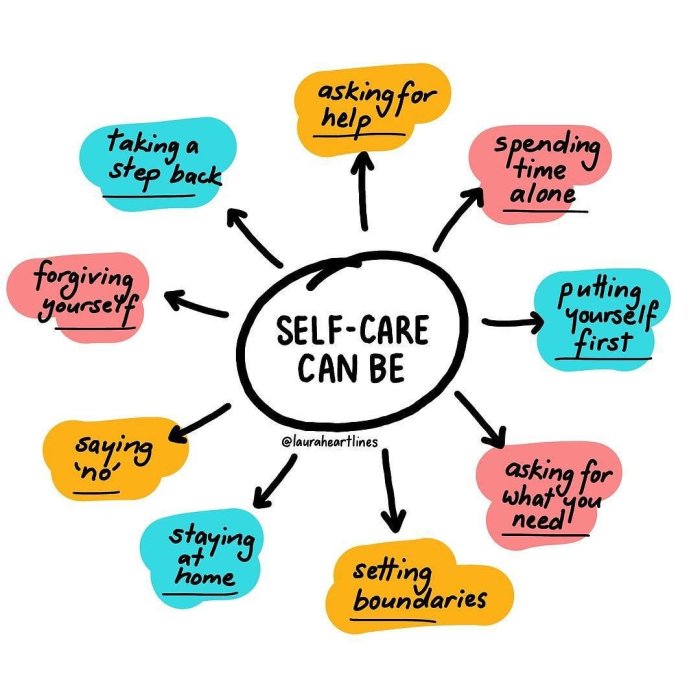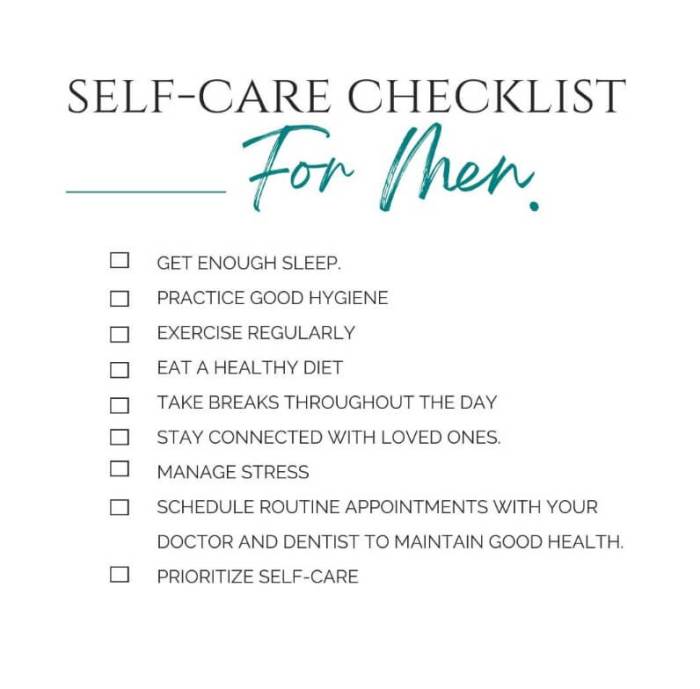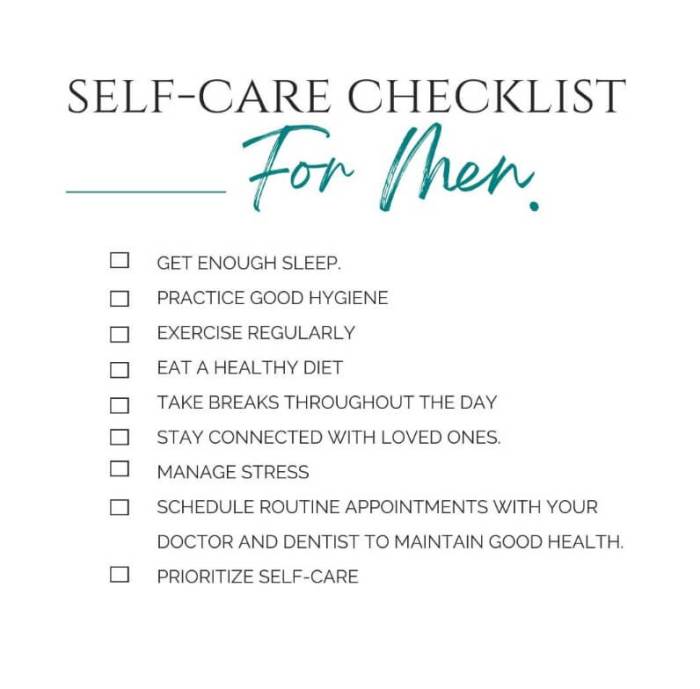Self-Care Routine Ideas take the spotlight, offering a glimpse into a world of wellness and balance. Get ready to dive into tips and tricks for a more fulfilling daily routine.
Explore morning rituals, stress-free evenings, physical activities, mental health strategies, social connections, and more in this comprehensive guide.
Self-Care Routine Ideas
In today’s fast-paced world, taking care of yourself is more important than ever. Here are some self-care routine ideas to help you prioritize your well-being.
Morning Self-Care Activities
Starting your day with self-care can set a positive tone for the rest of your day. Here are some morning self-care activities to consider:
- Practice mindfulness or meditation for a few minutes to center yourself.
- Stretch or do some light exercise to wake up your body.
- Enjoy a nutritious breakfast to fuel your day.
- Set intentions or affirmations for the day ahead.
Self-Care Rituals for a Stress-Free Evening Routine
Creating a calming evening routine can help you unwind and relax after a long day. Here are some self-care rituals to incorporate into your evenings:
- Take a warm bath or shower to relax your muscles.
- Read a book or listen to soothing music to wind down.
- Practice gratitude by journaling about positive moments from your day.
- Disconnect from screens at least an hour before bedtime to improve sleep quality.
The Importance of Incorporating Self-Care Practices
Self-care is crucial for maintaining overall well-being and managing stress. By incorporating self-care practices into your daily life, you can improve your mental, emotional, and physical health. Prioritizing self-care allows you to recharge, reduce stress, and enhance your quality of life.
Physical Self-Care

Feeling good physically is a key component of self-care. Engaging in different types of physical activities not only improves your physical health but also has a positive impact on your mental well-being.
Exercise is a crucial part of physical self-care as it helps release endorphins, also known as the “feel-good” hormones. This can reduce feelings of anxiety and stress, boost your mood, and increase your energy levels. Regular exercise also improves cardiovascular health, strengthens muscles and bones, and helps maintain a healthy weight.
Types of Physical Activities for Self-Care
- Cardiovascular exercises like running, cycling, or dancing to improve heart health and increase stamina.
- Strength training with weights or bodyweight exercises to build muscle and improve metabolism.
- Yoga or Pilates for flexibility, balance, and stress relief.
- Swimming for a full-body workout that is easy on the joints.
Creating a Personalized Fitness Plan
Listen to your body and choose activities that you enjoy and can stick to in the long run.
- Set specific, realistic goals for your fitness routine, whether it’s improving endurance, strength, or flexibility.
- Include a mix of different types of exercises to keep things interesting and target different muscle groups.
- Schedule your workouts at a time that works best for you and make it a priority in your daily routine.
- Track your progress to stay motivated and make adjustments to your plan as needed.
Mental and Emotional Self-Care

When it comes to self-care, mental and emotional well-being play a crucial role in maintaining overall health and happiness. Taking care of your mind and emotions is just as important as taking care of your physical body.
Significance of Mental Health in Self-Care, Self-Care Routine Ideas
Mental health is a fundamental aspect of self-care as it impacts how we think, feel, and act on a daily basis. Neglecting mental health can lead to increased stress, anxiety, and other emotional challenges that can affect our overall well-being.
Strategies for Managing Stress and Anxiety
- Practice deep breathing exercises to calm the mind and reduce stress levels.
- Engage in regular physical activity to release endorphins and boost mood.
- Establish boundaries and learn to say no to things that cause unnecessary stress.
- Connect with loved ones for emotional support and a sense of belonging.
- Consider therapy or counseling to address underlying issues contributing to stress and anxiety.
Mindfulness and Meditation for Emotional Well-Being
Practicing mindfulness and meditation can help enhance emotional well-being by promoting self-awareness, reducing negative thought patterns, and increasing overall peace of mind.
By staying present in the moment and focusing on your breath, you can cultivate a sense of calm and clarity in your mind.
Regular meditation practices can also improve emotional regulation, increase resilience to stress, and foster a greater sense of inner peace and contentment.
Social Self-Care: Self-Care Routine Ideas
Taking care of your social well-being is an essential aspect of self-care. Building and nurturing relationships with others can have a significant impact on your mental and emotional health.
It’s important to surround yourself with positive and supportive people who uplift you and make you feel valued. These relationships can provide a sense of belonging, reduce feelings of loneliness, and offer a support system during challenging times.
Nurturing Relationships Ideas
- Make time for regular social interactions with friends and family members.
- Engage in activities that you enjoy together, such as going for a walk, watching a movie, or trying out a new hobby.
- Practice active listening and show genuine interest in the lives of those around you.
- Express gratitude and appreciation for the people who support you in your life.
Setting Boundaries in Social Interactions
- Learn to say no when you feel overwhelmed or need time for yourself.
- Communicate your needs and expectations clearly to avoid misunderstandings.
- Acknowledge and respect your own limits to prevent burnout or resentment.
- Avoid toxic relationships or situations that drain your energy and negatively impact your well-being.
